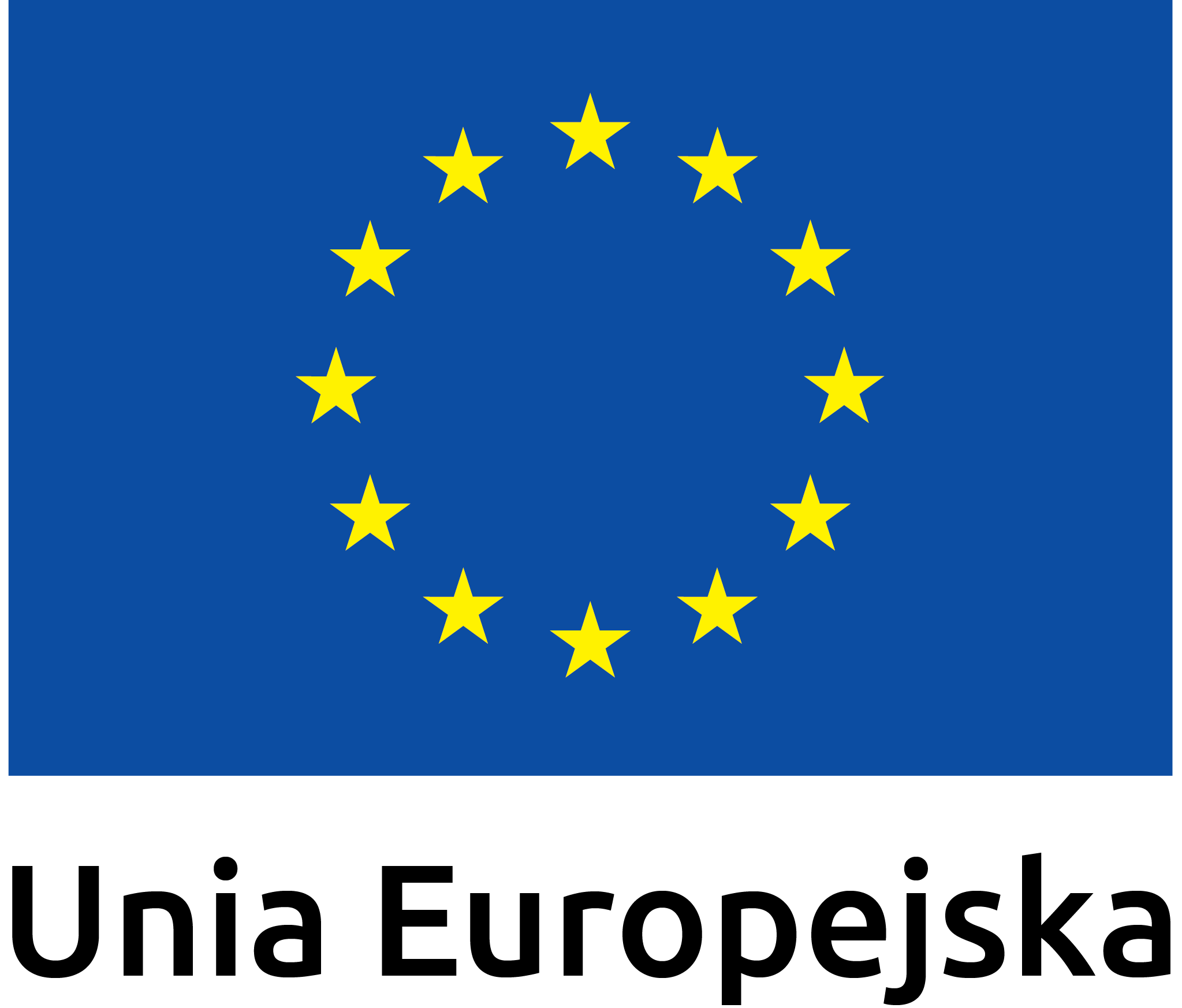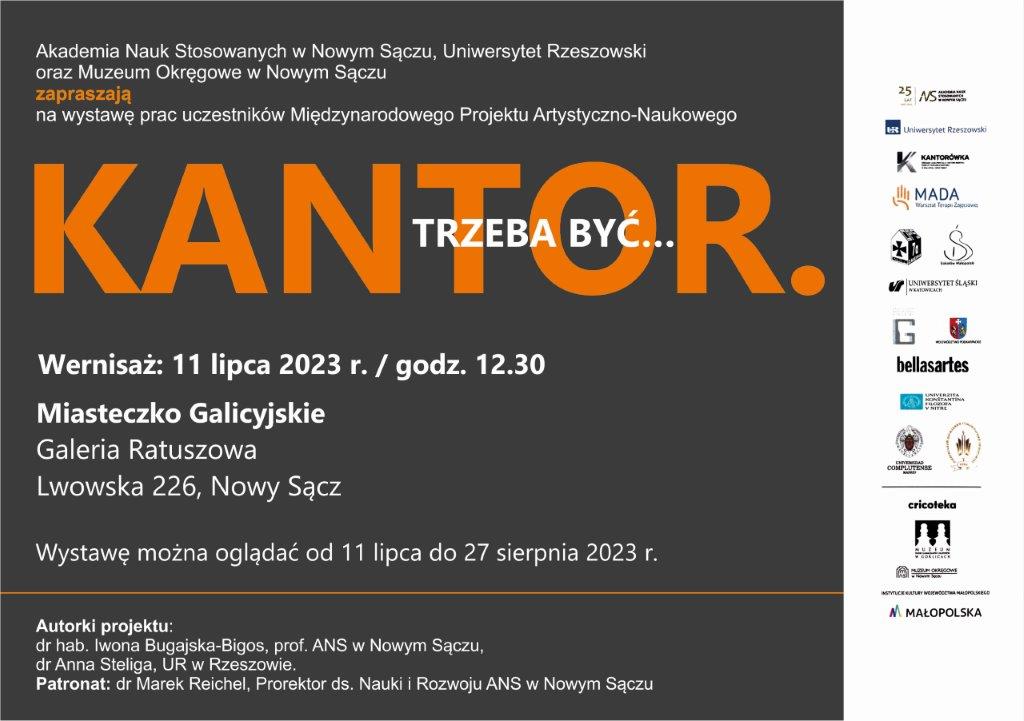Exhibition
Kantor. Must be...
Academy of Applied Sciences in Nowy Sącz (Faculty of Social Sciences and Art, art and design faculties), University of Rzeszów in Rzeszów and
The District Museum in Nowy Sącz invites you to an exhibition of works inspired by the work of the outstanding Polish artist - director, stage designer, painter Tadeusz Kantor.
The works were created as part of the International Artistic and Scientific Project entitled CANTOR. MUST BE...
Honorary patronage over the project:
dr Marek Reichel, Vice-Rector for Science and Development, Academy of Applied Sciences in Nowy Sącz.
Project concept: dr hab. Iwona Bugajska-Bigos, prof. ANS, dr Anna Steliga, UR in Rzeszów.
On December 8, 1990, Tadeusz Kantor, the stage designer and director, founder and manager of the Cricot 2 Theatre, died while working on the performance "Today is my birthday" - that's what the press reported 32 years ago.
We, the initiators of the International Artistic and Scientific Project. CANTOR. YOU HAVE TO BE... (…), we return to this "the most worldly of Polish artists and the most Polish of world artists". Even if 32 years ago the press said goodbye to Kantor rather laconically, today no one should have any doubts that one of the greatest artists of the 20th century left us in 1990. However, is it easy to explain to artists from other cultural and national areas or to artists from the youngest generation of artists, as well as people with disabilities who express themselves through art, what the phenomenon of his imagination was about?
Undoubtedly, Kantor was a versatile artist. He used to refer to himself as "total". (…) For many, he will forever be a man of the theatre, and others will "separate" him as a painter, scenographer, poet, actor or happener. However, everyone will agree on one thing - in each of these "disciplines" he thought with images, only more often he used actors and props instead of paints. Just as Kantor used various means of expression, we invited a diverse set of guests to this project (…).
The organizers of the project are two academic centers from Poland, i.e. the Academy of Applied Sciences from Nowy Sącz, the Faculty of Social Sciences and Art, the Art and Science Club "Piekarnia" and the Institute of Fine Arts from the University of Rzeszów in Rzeszów. The partners of our project are primarily: Kantorówka - Center for Documentation and History of the Region - Tadeusz Kantor Museum (Wielopole Skrzyńskie, Poland), CRICOTEKA Center for Documentation of the Art of Tadeusz Kantor (Kraków, Poland), Museum Dwory Karwacjanów i Gładyszów in Gorlice, as well as the District Museum in Nowy Sącz and the Gallery of Contemporary Art in Przemyśl (Poland).
Guests participating in the project include: from the University of Silesia (Katowice, Poland), the State Academy of Applied Sciences (Przemyśl, Poland), significant foreign academic centers and institutions, e.g. from Slovakia, Ukraine, Spain, as well as artists from e.g. the United States, Austria, France or Latvia. Centers with artists with disabilities also responded to the invitation. These are both the MADA Occupational Therapy Workshop from Nowy Sącz, which cooperated with us on many previous projects, and the Social Welfare Home for the Chronically Mentally Ill from Rzeszów, but also the Community Self-Help Home from Sokołów Małopolski.
The artistic biography of Tadeusz Kantor is a condensed history of contemporary art. His work is a lesson of true avant-garde: fidelity to constant creation, constant fear of risk, self-transcendence. Choosing one proven convention is a threat of ossification, artistic opportunism. Throughout his art, Kantor strove for the Great Synthesis. And we invited various participants of the project to dialogue with such an open artistic attitude.
In our home universities, the task of dealing with Kantor's art was given to, among others, first-year undergraduate students. (…) All participants of the project reached for the entire range of the Master's activities and undertook a dialogue with his work. Although the prop, which is an umbrella, was tempting first of all (and tempted some to create their own projects), the discourse was undertaken, among others, by with projects of impossible architecture, with collage, emballage, informel, or selected elements of the theater by creating mock-ups, props and often bringing puppets to life in stop-motion animations. (…)
For Polish (but as our project shows - not only) art, Tadeusz Kantor is an important artist - a symbol of the 20th century. We cordially invite you to dialogue with the Master and to the world of artists who reinterpret Kantor in their own way, in accordance with the Master's principle that art is fighting for freedom, if there is no fight for freedom, then there is no art!
Authors:
dr hab. Iwona Bugajska-Bigos, prof. ANS
dr Anna Steliga, UR in Rzeszów
Honorary patronage over the project:
dr Marek Reichel, Vice-Rector for Science and Development, Academy of Applied Sciences in Nowy Sącz.
Project concept: dr hab. Iwona Bugajska-Bigos, prof. ANS, dr Anna Steliga, UR in Rzeszów.
On December 8, 1990, Tadeusz Kantor, the stage designer and director, founder and manager of the Cricot 2 Theatre, died while working on the performance "Today is my birthday" - that's what the press reported 32 years ago.
We, the initiators of the International Artistic and Scientific Project. CANTOR. YOU HAVE TO BE... (…), we return to this "the most worldly of Polish artists and the most Polish of world artists". Even if 32 years ago the press said goodbye to Kantor rather laconically, today no one should have any doubts that one of the greatest artists of the 20th century left us in 1990. However, is it easy to explain to artists from other cultural and national areas or to artists from the youngest generation of artists, as well as people with disabilities who express themselves through art, what the phenomenon of his imagination was about?
Undoubtedly, Kantor was a versatile artist. He used to refer to himself as "total". (…) For many, he will forever be a man of the theatre, and others will "separate" him as a painter, scenographer, poet, actor or happener. However, everyone will agree on one thing - in each of these "disciplines" he thought with images, only more often he used actors and props instead of paints. Just as Kantor used various means of expression, we invited a diverse set of guests to this project (…).
The organizers of the project are two academic centers from Poland, i.e. the Academy of Applied Sciences from Nowy Sącz, the Faculty of Social Sciences and Art, the Art and Science Club "Piekarnia" and the Institute of Fine Arts from the University of Rzeszów in Rzeszów. The partners of our project are primarily: Kantorówka - Center for Documentation and History of the Region - Tadeusz Kantor Museum (Wielopole Skrzyńskie, Poland), CRICOTEKA Center for Documentation of the Art of Tadeusz Kantor (Kraków, Poland), Museum Dwory Karwacjanów i Gładyszów in Gorlice, as well as the District Museum in Nowy Sącz and the Gallery of Contemporary Art in Przemyśl (Poland).
Guests participating in the project include: from the University of Silesia (Katowice, Poland), the State Academy of Applied Sciences (Przemyśl, Poland), significant foreign academic centers and institutions, e.g. from Slovakia, Ukraine, Spain, as well as artists from e.g. the United States, Austria, France or Latvia. Centers with artists with disabilities also responded to the invitation. These are both the MADA Occupational Therapy Workshop from Nowy Sącz, which cooperated with us on many previous projects, and the Social Welfare Home for the Chronically Mentally Ill from Rzeszów, but also the Community Self-Help Home from Sokołów Małopolski.
The artistic biography of Tadeusz Kantor is a condensed history of contemporary art. His work is a lesson of true avant-garde: fidelity to constant creation, constant fear of risk, self-transcendence. Choosing one proven convention is a threat of ossification, artistic opportunism. Throughout his art, Kantor strove for the Great Synthesis. And we invited various participants of the project to dialogue with such an open artistic attitude.
In our home universities, the task of dealing with Kantor's art was given to, among others, first-year undergraduate students. (…) All participants of the project reached for the entire range of the Master's activities and undertook a dialogue with his work. Although the prop, which is an umbrella, was tempting first of all (and tempted some to create their own projects), the discourse was undertaken, among others, by with projects of impossible architecture, with collage, emballage, informel, or selected elements of the theater by creating mock-ups, props and often bringing puppets to life in stop-motion animations. (…)
For Polish (but as our project shows - not only) art, Tadeusz Kantor is an important artist - a symbol of the 20th century. We cordially invite you to dialogue with the Master and to the world of artists who reinterpret Kantor in their own way, in accordance with the Master's principle that art is fighting for freedom, if there is no fight for freedom, then there is no art!
Authors:
dr hab. Iwona Bugajska-Bigos, prof. ANS
dr Anna Steliga, UR in Rzeszów

